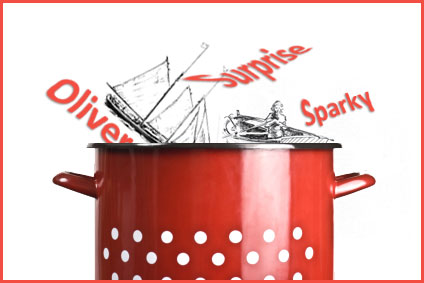A few weeks ago, I answered questions from a very bright third grade class. They asked about editing (“Do your stories change after you write them?”), and I told them that second drafts are where the real story appears. They asked about my sailing (“Did you just watch the Olympics, or did you actually play?”), so I tried to explain what an honor it was to represent my country.
Finally, they got around to the big one: “Where do you get your ideas?”

After countless booksignings and author interviews, I should be used to this question—but I have yet to develop a satisfying answer. I usually fall back on the stock reply: “my imagination.” Since that’s not really an explanation, here’s an example.
I came up with the idea for Oliver’s Surprise while gazing out the window on an October morning, trying to write a Christmas story for my 12 year old nephew. I stare out the window all the time, and usually I don’t actually see what’s right in front of me. But on this particular day, my eye was caught by a nondescript leaf blowing down the street toward Narragansett Bay.
At the end of our street is a small boat yard, which that year was struggling to redefine itself under a new owner. And moored off the boatyard was our 1938 Herreshoff Marlin, which would soon be hauled out for the winter.
As my eyes followed the leaf, I found myself wondering: what would happen if a 12 year old boy like my nephew decided to play hooky on a September afternoon, and he followed the leaf down the street to the boat yard…
And then my thoughts danced off in a practical direction: finding a yard qualified to haul an old wooden boat that survived the ’38 Hurricane…
…until I dragged my mind back to the problem at hand: what would this boy find at the end of the street that was worth writing about?
And out of nowhere came the key phrase: “He travels back in time to 1938, just before the hurricane.”
Without that last thought, I could’ve followed the fictional Oliver around for weeks without writing anything of interest. What made the story special was this step back into the past. I’d found a way to explore what a 21st century boy would find different—or not so different—about his grandparents’ lives seventy years earlier.
Looking back on that fateful morning, it all seems so straightforward. Weeding out the real story, however, took a lot of writing and rewriting. Remember what I told the third graders about editing? In the first draft, I thought I was writing a story about a boy and his skiff, Sparky. It wasn’t until the drawings arrived that I realized the story was about a boy and the schooner Surprise. A true surprise, even for the author.
Which is why it’s so hard to describe where I get my ideas. The best ones are the mad stepchildren of experience gathered haphazardly together on a page—sparked into distinction by something as ordinary as an October leaf blowing down the street.
So the next time I get that question, “Where do you get your ideas?,” maybe I’ll say this:
“My books come from the melting pot of my life, stirred by the spoon of an idea, spiced with the details that blow past me every day, and left to simmer for weeks and months and years until the real story bubbles to the top.”
Or maybe I’ll just fall back on the safe answer: “My imagination.”
One Reply to “Stirring Stories from the Mental Melting Pot”
Comments are closed.